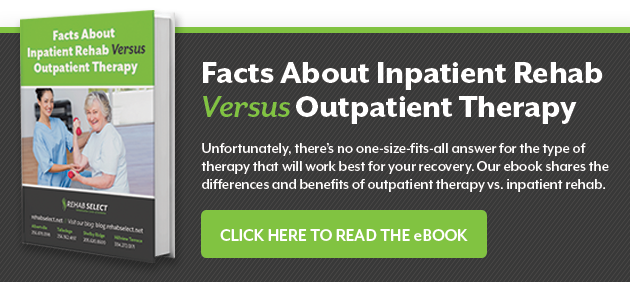
Orthopedic rehabilitation can be highly effective for many patients. In some cases, patients may be referred for a full inpatient orthopedic rehab program; in others, an outpatient or home care program may be enough to help support patient recovery. In this article, we’ll break down the benefits of orthopedic rehabilitation, and help you to figure out whether an inpatient or outpatient treatment would be more appropriate for you or your loved one.
When is Orthopedic Rehabilitation Recommended?
Orthopedic medicine relates to problems with joints, bones, and muscles. Orthopedic rehab is recommended to patients who have recently undergone orthopedic surgery, or who have a medical condition that is impacting their musculoskeletal health. Common orthopedic surgeries include:
- Hip, knee or shoulder replacement
- Limb amputation
- Spinal surgeries
- Joint fusion
- Sports surgeries, such as ACL repair
- Carpal tunnel surgery
Non-surgical conditions that may be referred for orthopedic rehabilitation include:
- Arthritis
- Osteoporosis
- Sciatica
- Stroke
What are the Benefits of Orthopedic Rehab?
In many cases, orthopedic rehab can be highly beneficial, helping restore a patient’s quality of life and return them to their everyday activities more quickly. Some of the most important benefits of a rehab program include:
1. A comprehensive, customized treatment plan
Whether as an inpatient or an outpatient, anyone receiving orthopedic rehab will be given a treatment program designed to accommodate their unique condition, challenges, physical state, and overall well-being. Whether you are recovering from orthopedic surgery or suffering from a bone, joint, or muscle disorder, you are likely to be dealing with high levels of pain and discomfort, as well as multiple complex physical and mental challenges.
Rehab teams take a holistic, whole-body approach to help you get better as quickly as possible. In some facilities, there will be an orthopedic specialist in your rehab team who will ensure you benefit from the latest research and treatments in their field.
2. Less pain
One of the main benefits of a rigorous rehab program is to help manage and reduce pain. By building up muscle tone and increasing flexibility and strength through safe, supervised exercise, patients will be more likely to experience less pain as a result of their surgery or condition. As well as improving the overall quality of life, decreasing pain levels will also mean you can take lower doses of pain medications.
3. Reduce the risk of future injury and hospitalization
Orthopedic rehab can significantly reduce the risk of ending up back in the hospital. It can help build up balance and enable you to feel more confident performing day-to-day activities, like climbing stairs or getting out of bed. As well as helping you get back into the swing of things more quickly, this also makes them less likely to fall and end up back in surgery. Physical therapy can also help promote circulation by keeping the affected limb or limbs mobile. This will reduce the risk of blood clots and other serious post-surgical complications.
4. Boost your mood
Regular, supervised exercise is not only a vital part of any orthopedic rehab program – it’s also a great way to improve your mood, as well as keeping your memory and cognition sharp. What’s more, working with a team of rehab professionals can help to keep you motivated and on target as you work towards your rehab goals.
When Would An Inpatient Rehab Program Be Better?
It can sometimes be tricky to choose between an inpatient rehab program and outpatient treatment. Inpatient rehab involves staying in a rehab facility for a course of intensive rehab. The length of stay varies from patient to patient, between a few days and a month or more, depending on your situation. During outpatient rehab, on the other hand, you’ll stay at home and either visit rehab professionals in a facility or hospital or receive treatment in your own home.
To weigh up the pros and cons of each approach, you’ll need to take into account:
1. The complexity of the recovery
In general, for a straightforward orthopedic surgery or minor orthopedic condition, outpatient rehab will be sufficient. However, for major operations like a joint replacement, or a more severe condition such as a stroke, inpatient rehab may well be recommended. Inpatient treatment gives you 24-hour access to your rehab team and facilities and is usually more intensive. It may also be safer if you are at risk of complications, such as blood clots, as staff will be on hand to check on you at all times.
2. The level of impairment
Orthopedic injuries, and serious orthopedic conditions like severe arthritis, can be extremely debilitating. If you are unable to manage basic daily care activities, such as getting in and out of bed, handling personal hygiene, getting dressed, or managing your own medications, then you would be strongly recommended to consider an inpatient rehab program rather than outpatient care.
3. Lack of support at home
For some people, family members are both available and physically able to provide all the care the patient needs to recover. Others may be able to afford home help. However, for many people recovering from orthopedic surgery or illness, there is not enough support available at home to help care for them adequately. For instance, an older partner might not be able to help you up the stairs or in and out of the bath. In those cases, inpatient orthopedic rehab will be the better option until you can take care of yourself.
4. Time pressure
Inpatient orthopedic rehab is designed to get you back to your daily life as quickly as possible. If you are under time pressure – to return to work, or resume family responsibilities, for example – then it may be better to undergo inpatient rehab. Inpatient rehab teams work together to create a customized and comprehensive treatment program that is highly effective at restoring maximum function to orthopedic patients.
If you’d like to find out more about how Rehab Select helps orthopedic patients recover quickly and safely, click here to contact us or schedule a tour at one of our facilities.





